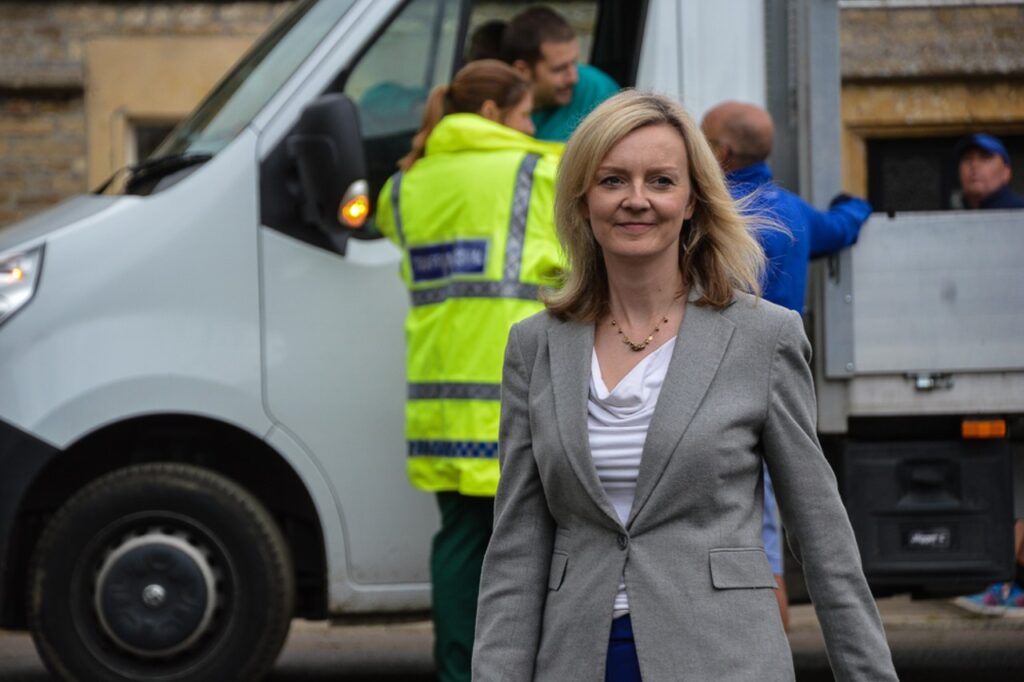The party faithful have spoken. Mary Elizabeth Truss, MP for South West Norfolk, has been elected the new Conservative leader and our new Prime Minister. But how will green policy fare under her leadership?
The need to cut our fossil fuel consumption has never been more urgent. Not only is the UK struggling to deliver on its climate targets, but our gas dependence makes us vulnerable to global supply problems and price volatility.
Organisations representing pub chains, factories and corner shops have joined poverty campaigners to call for urgent action on unaffordable energy bills. Yesterday Liz Truss pledged “immediate action” on the energy crisis should she become PM, but it is not yet clear what form this action will take.
The government already has strategies in place that could help our new Prime Minister formulate a response. The Energy Security Strategy, published in the spring, was designed to protect consumers from rising prices and boost our energy independence while also accelerating the net zero transition. It recognises that investment in renewables can help with all these aims, so it outlines an ambition for the UK to become the “Saudi Arabia of wind power” and committed to “slash red tape” on both wind and solar installations.
This commitment to wind power has been in place since 2020’s Ten Point Plan for a Green Industrial Revolution and was also repeated in last autumn’s Net Zero Strategy. It seems likely that Liz Truss will honour this commitment. Her campaign website repeats the pledge to produce 40GW of offshore wind power by 2030, enough to power every home in the UK.
A shadow over solar?
The Energy Security Strategy outlines the intention to remove bureaucratic barriers to new solar installations. But it is entirely possible that our new Prime Minister will do the opposite. In 2014, as Environment Secretary, Truss cut a taxpayer subsidy to farmers and landowners for installing solar, on the grounds that the land could be better used for growing vegetables and that solar panels are “ugly”.
It does not seem as if her stance has changed in the meantime. On the campaign trail she repeated a commitment to ensure that agricultural land is not repurposed for solar. Speaking at a hustings in Exeter in August 2022, she said: “Our fields should be filled of our fantastic produce – whether it’s the great livestock, the great arable farms. It shouldn’t be full of solar panels and I will change the rules. I will change the rules to make sure we are using our high value agricultural land for farming.”
Trade association Solar Energy UK and the Association for Renewable Energy and Clean Technology both expressed “deep concern” over the comments. The reality is that ground-mounted solar panels cover just 0.1% of all land in the UK, and the energy strategy’s ambitious plans to scale up solar would take this to roughly 0.3%.
A backwards step on energy efficiency?
Another vital tool for cutting emissions and reducing our energy bills is energy efficiency. The International Energy Agency estimates that globally, prompt action on energy efficiency could cut consumption by 95 exajoules a year. That’s 95 quintillion joules, or roughly China’s entire annual consumption.
At a national level, there is huge potential for energy saving in several areas. According to the Building Research Establishment, the UK has the oldest housing stock in Europe, and most likely in the world. Badly insulated houses are a significant source of greenhouse gas emissions and also a driver of fuel poverty.
As for businesses, it is estimated that UK businesses waste over £30 billion worth of energy every year. That is enough to power London for seven years.
Right-wing think-tank Onward recently published a suggested raft of measures to reduce fuel use through behavioural change, in order to help the UK on its net zero journey.
Unfortunately, it does not look likely that Liz Truss will move forwards with desperately needed measures to reduce energy demand. In fact, it looks quite likely that she will do the opposite. Truss has talked about scrapping green levies on fuel bills, but it is not clear whether this will be just for businesses in energy-intensive industries or for everyone.
Despite the name, these green levies aren’t just about cutting carbon. Some of the money raised goes to schemes which help vulnerable people to insulate their homes, ultimately cutting energy costs. Another part of the money funds new renewable power sources, helping to bring costs down for everyone as well as cutting carbon. Green levies also pay for the Warm Home Discount Scheme, vital help for people on low incomes. Scrapping the green levies will be a retrograde step for the climate and mean higher bills for everyone.
Voting record
Our new Prime Minister has committed to “double down” on progress towards the target of net zero emissions by 2050 and has spoken about how transitioning to a green economy means many opportunities to create new jobs.
But her voting record over 12 years as an MP shows that she has generally voted against measures to prevent climate change. In recent years there have been votes about requiring the Financial Conduct Authority and people running pension schemes to consider the UK’s net zero target when assessing financial risk. Liz Truss voted against both of these motions, which puts her at odds with the UK government’s recent direction of travel. The requirement for certain businesses to carry out TCFD-aligned reporting is an acknowledgement that climate risk equals investment risk, and that investors deserve transparency on this.
Truss has also consistently voted in favour of selling off England’s state-owned forests and generally voted against financial incentives for renewable electricity generation. She voted against requiring new-build homes to have lower emissions and introducing a “polluter pays” principle for the decisions of public authorities.
We don’t yet know what the new Prime Minister’s strategy is for getting the UK back on track for net zero, accelerating the green energy transition or indeed mitigating the energy crisis. We await her first green policy announcements with interest.
“Liz Truss” by Gareth Milner is licensed under CC BY 2.0.

